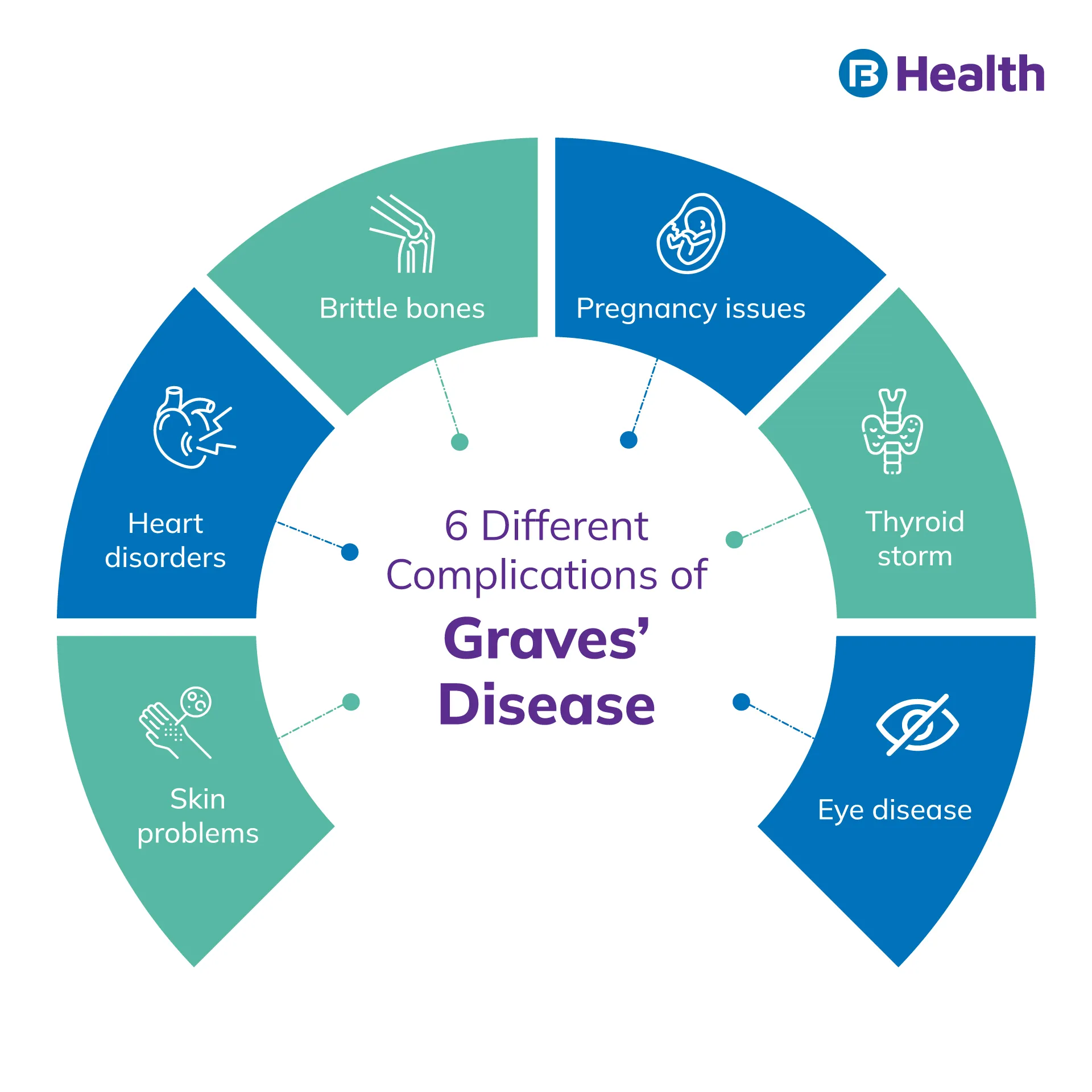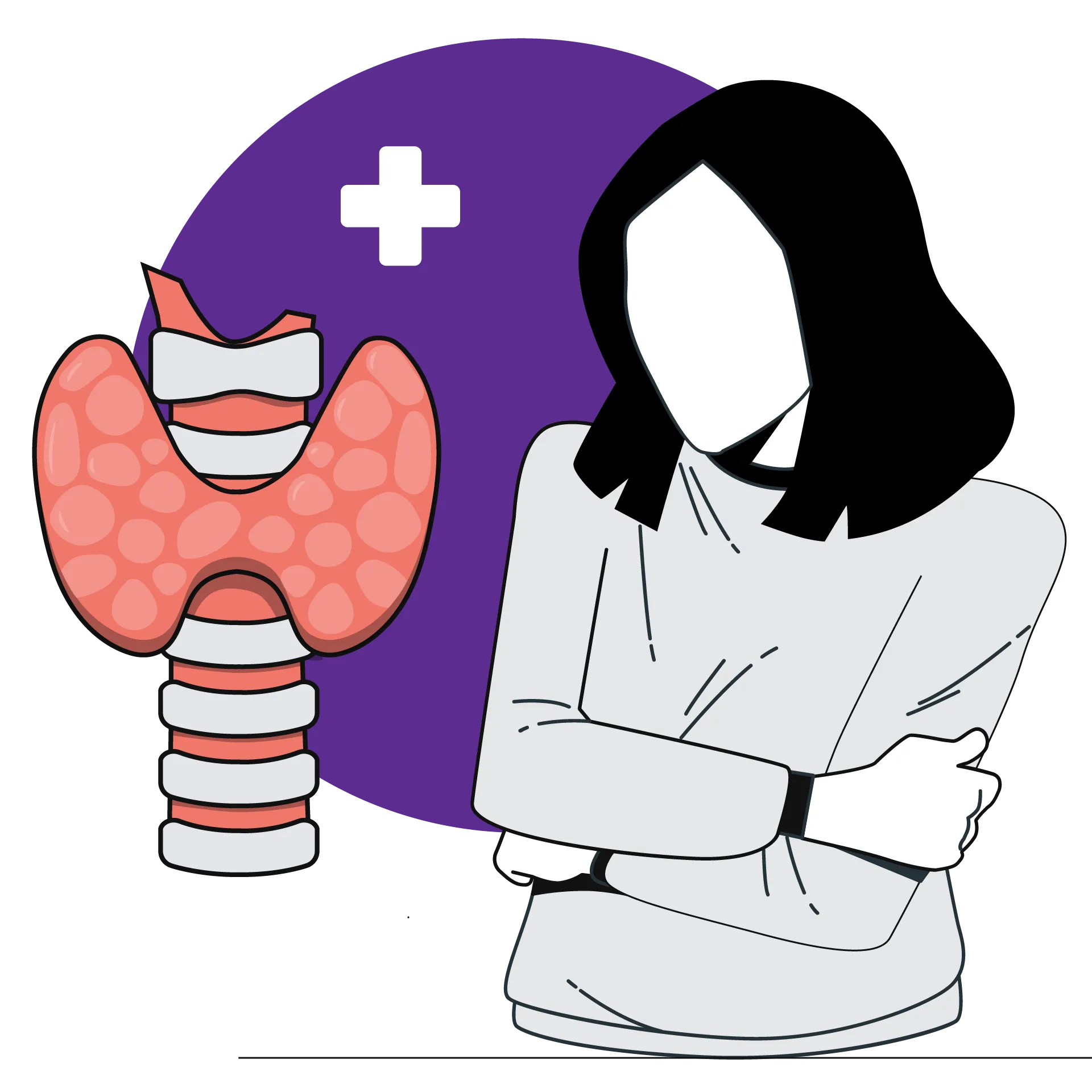Thyroid | 4 min read
What is Graves’ Disease: Symptoms, Causes, and its Treatment
Medically reviewed by
- Table of Content
Key Takeaways
- Anxiety, goiter, and fatigue are common Graves’ disease symptoms
- Graves’ disease is an autoimmune condition with no cure
- Anti-thyroid medications help in Graves’ disease treatment
Graves’ disease is an autoimmune disorder that is the most common cause of hyperthyroidism. It leads to an overactive thyroid gland that produces too much thyroxine hormone. In Graves’ disease, the immune system produces antibodies called thyroid-stimulating immunoglobulins. These attack healthy thyroid cells and cause problems. An overactive thyroid further affects other organs and cells including the heart, bones, and muscles.
Thankfully, the Graves’ autoimmune disease is rare. However, women are seven times more at risk of developing this condition compared to men [1]. It is also common in people below 40 years of age. Graves’ disease treatment aims at reducing thyroid hormones in the body to control the symptoms. Read to know about the Graves’ disease meaning, its symptoms, and common treatment routes.
Additional Read: Overactive Thyroid GlandSymptoms of Graves’ disease
Identifying Grave’s disease symptoms can be tricky as many are quite common with other health issues. The best way is to consult a online doctor as soon as you notice one or more of these signs.
- Anxiety
- Goiter
- Fatigue
- Weight loss
- Irritability
- Sweating
- Bulging eyes
- Arrhythmia
- Nervousness
- Heart palpitations
- Sleeping problems
- Heat sensitivity
- Weak muscles
- Irregular periods
- Erectile dysfunction
- Finger or hand tremors
- Perspiration or moist skin
- Menstrual cycle changes
- Frequent bowel movements
- Flushed skin on the shins
- Inflammation of the eyes
- Tachycardia
- Lower libido

Graves’ disease causes
Graves’ disease is caused by an autoimmune response from your body. However, the reason for this is still not clear [2]. If you have this disease, your immune system overproduces an antibody known as thyroid-stimulating immunoglobulin (TSI) instead of specific antibodies. The TSI attacks healthy thyroid cells. The trigger may be caused by a combination of genes or exposure to external factors like a virus.
Many risk factors increase the risk of developing Grave’s autoimmune disease. These include the following:
- Genes or family history of thyroid disease<span data-ccp-props="{"201341983":0,"335559739":0,"335559740":240}">
- Age – Graves’ disease is more common in people below 40 years of age
- Gender – Women are more at risk of Graves’ disease than men
- Pregnancy
- Smoking
- Emotional or physical stress
- Vitiligo disease
- Pernicious anemia
- Having other autoimmune diseases such as rheumatoid arthritis, lupus, and type 1 and type 2 diabetes
Graves’ disease diagnosis
A diagnosis normally involves your doctor assessing your family and medical history and conducting a physical examination. If they think you have Graves’ disease, they may ask you to undergo blood tests to measure thyroid-stimulating hormones. Additionally, doctors may advise the following tests to confirm or rule out this disease.
- Thyroid ultrasound
- Radioactive iodine uptake test
- Thyroid imaging test
- Thyroid-stimulating immunoglobulin test
Graves’ disease treatment
Although Graves’ disease is a lifelong condition, there are some Graves’ disease treatment options that can help manage its effects.
Antithyroid medications
These medications stop thyroid hormones production by blocking it. Examples of antithyroid medications include methimazole and propylthiouracil. However, there may be some side effects such as low blood count and different types of skin rashes in a few cases. Taking medications may also increase the risk of infection.
Beta-blockers
Beta-blockers are often the initial choice of treatment. These prevent thyroid hormones from functioning as it flows in the bloodstream. You can stop taking beta-blockers once your thyroid levels are at healthy levels. Beta-blocker medications such as propranolol and metoprolol are prescribed to control increased heartbeat, trembling, nervousness, and other symptoms.

Radiation therapy
Radiation therapy or radioiodine therapy involves taking radioactive iodine orally in the form of a pill, capsule, or liquid. The therapy aims at gradually destroying thyroid gland cells that produce the thyroid hormones. People who undergo radioactive iodine therapy often helps to develop hypothyroidism, which is much easier to manage.
With this therapy, your thyroid gland shrinks thereby bringing your hormone levels to normal. However, women who breastfeed or are pregnant aren’t recommended this type of treatment.
Additional Read: Radiotherapy for CancerSurgery
Managing Grave’s disease with surgical treatment is not as common as other types and may be done when other treatments fail. It involves removing all or some part of the thyroid gland surgically. Doctors may prescribe it to pregnant women or those who have large goiters.
After undergoing surgery, a person may develop hypothyroidism, a condition with little or no production of thyroid hormones. In such a case, your doctor will prescribe thyroid replacement medications such as levothyroxine. Those who undergo thyroid surgery may experience temporary side effects including neck pain and weak or hoarse voice.
If a diagnosis confirms that you have Graves’ disease, start taking appropriate measures to control thyroid hormones production. You can follow a Graves’ disease diet by adding foods that are rich in calcium, vitamin D, magnesium, and selenium. For expert guidance, book online consultation with doctors near you on Bajaj Finserv Health. Get advice from top specialists and get the right treatment to stay healthy. Avail Bajaj Finserv Health card and Get Rs. 2,500 Lab & OPD benefit which can be used across pan India.
- References
- http://www.rarediseasesindia.org/graves#:~:text=Graves'%20disease%20is%20a%20rare,7%3A1%20compared%20to%20men.
- https://www.niddk.nih.gov/health-information/endocrine-diseases/graves-disease#causes
- Disclaimer
Please note that this article is solely meant for informational purposes and Bajaj Finserv Health Limited (“BFHL”) does not shoulder any responsibility of the views/advice/information expressed/given by the writer/reviewer/originator. This article should not be considered as a substitute for any medical advice, diagnosis or treatment. Always consult with your trusted physician/qualified healthcare professional to evaluate your medical condition. The above article has been reviewed by a qualified doctor and BFHL is not responsible for any damages for any information or services provided by any third party.




